 Geoff Dutton | in
Geoff Dutton | in  Business,
Business,  Design
Design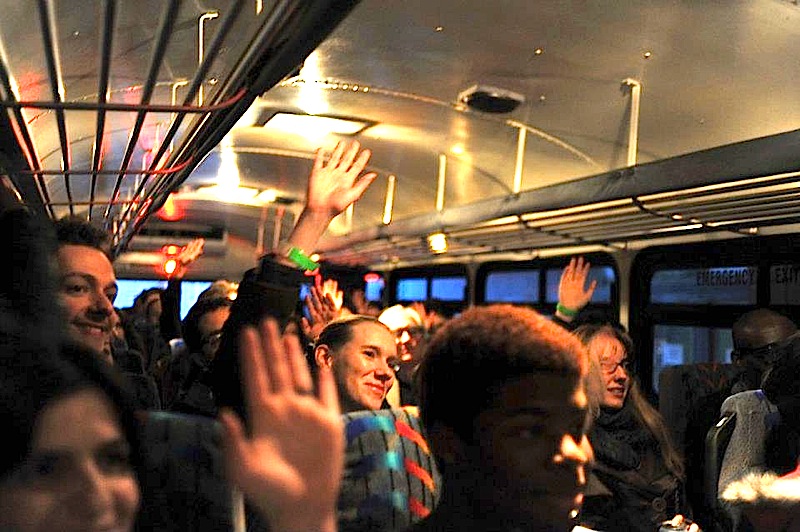 On the Experience Economies bus.
On the Experience Economies bus.
Would you spend ten dollars for a guided tour of innovation hotspots? A hundred Boston-area folks did, one night in February. Associates at the Laboratory at Harvard (described here several months ago) guided them through four local venues where new ideas, companies and products are hatched and incubated, throwing in some performance art and good food to leaven the experience.
The Lab itself hatches ideas. Undergraduate and graduate students who take the lab's courses break into teams and brainstorm ideas for socially useful inventions. Then they prototype them, test them, and sometimes go on to found companies to make, market and distribute them. That's a relatively recent role for Harvard's teaching mission, though it's been part and parcel of MIT's M.O. for decades.
The event, Innovate or Die, was planned and organized by a collaborative called Experience Economies (ExEc) and the Laboratory. To pull it off, they chartered two busses and threw a buffet dinner and a pizza party with the help of a dozen volunteers and a caterer. It was the sixth ExEc event, and considerably more ambitious than previous ones (videos are here). It was also fully subscribed. Tickets (only $10) sold out in about a minute. Even the Boston Red Sox can't beat that.
The organizers pitched this "tour of Boston's innovation landscape" like this:
This multimedia and multi-venue event will bring audiences inside the doors of some of the region’s visionary ventures, foundations, and research laboratories, engines at the leading edge of the emergent innovation economy. Each stop has been paired with artworks, performances, presentations and other surprise events exploring innovation – how it is conceptualized, pursued and lived in Boston and Cambridge, now and historically.
Participants registered at the Harvard campus at 5 PM and were assigned to one of two busses based on the color of the "Innovate or Die" tote bags they had received. Interlocutors/hosts Gavin Kroeber and Rebecca Uchill (the prime organizers) on one bus, and Suelin Chen (Lab Director) and Dave Strasfeld on the other, handed out snacks and printed matter for each site along the tour. Almost seven hours later, the busses hauled everyone back to Harvard. It was a full night.
The Harvard Innovation Lab (i-lab) brings together teams of students, faculty, entrepreneurs and members of the local community to develop ideas and launch new businesses. At the i-lab, an open-plan office and classroom facility where writing on the walls is encouraged, tour participants got a short lecture from history of science scholar Jeremy Blatter about how a Harvard psychology lab pioneered marketing research in the early 20th century. Visitors broke up into small teams for an exercise in brand recognition, trying to differentiate original from copycat brands from pictures and logos of products from a century or more ago.
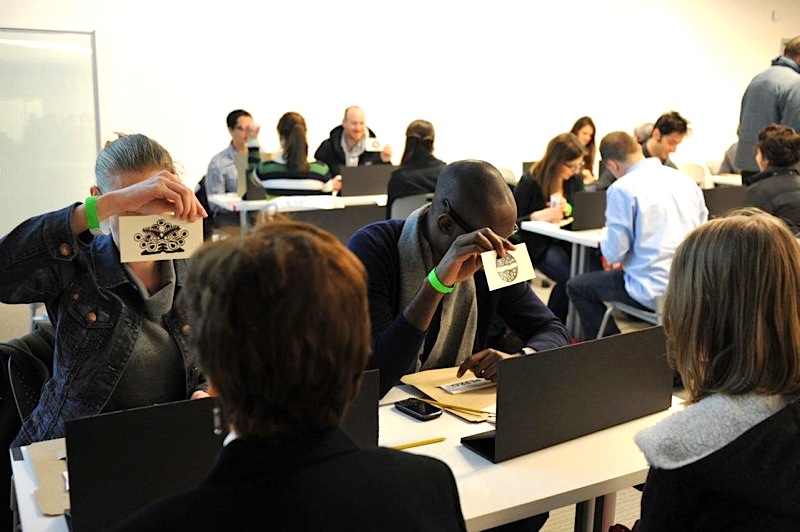 Exercise in brand recognition at Harvard i-Lab
Exercise in brand recognition at Harvard i-Lab
Continuum is a global design consultancy that helps organizations create products, establish brands and strategize product lines. Its “products” might be studies, brochures, procedures, policies, or merely suggestions on increasing clients' productivity and market appeal. When the tour parked at its office in a Boston suburb, local artists Kelly Sherman and Catherine McMahon were on hand to present their work. Sherman described how a group of local inner-city teens she worked with defined and interrogated a problem: a "fight" and its causes. The exploration and role-playing resulted in a play about violence in their schools that the group performed at a local high school last fall. At Continuum, Sherman lined a conference room with hand-drawn posters festooned with post-it notes documenting the exercise.
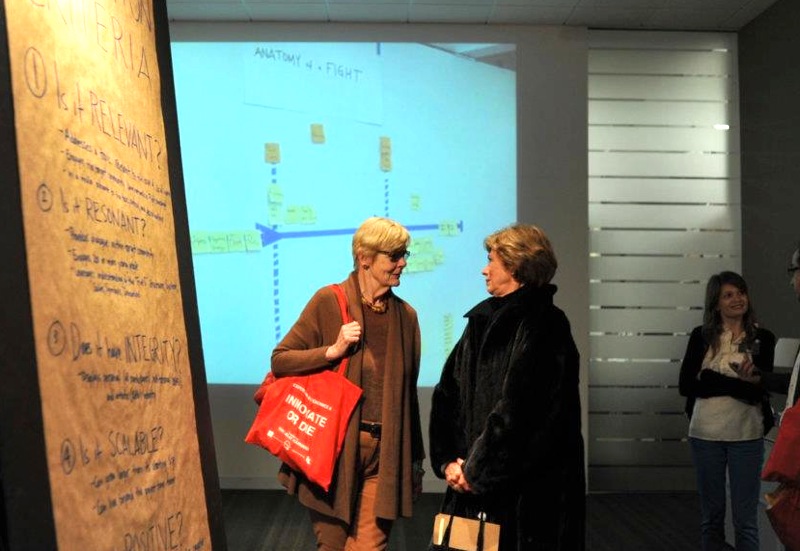 ExEc participants conversing at Continuum with Kelly Sherman standing by
ExEc participants conversing at Continuum with Kelly Sherman standing by
McMahon and collaborating artist Tomashi Jackson took over Continuum's observation suite to videotape the tourists giving goofy TED talks while the others observed from the control room. The talkers first filled in the blanks in Mad Libs-type scripts, and then stood and delivered their impromptu narratives. Then the group partook of a tasty buffet dinner and schmoozed with the crew before being shooed back on the busses and whisked to downtown Boston. On the way, they were given bananas (good brain food) and AeroShots (caffeine and vitamin dispensers, designed at The Lab), and assigned "tutors" to "prepare" them to take a test at the next venue.
The Idea Translation Lab @ Cloud Place is a narrow brownstone building in the heart of Boston. By day it is an art-and-science learning environment where Boston high school students engage in creative problem solving, coached by artists, pedagogues, and other mentors.
The activity at Cloud Place was perhaps the strangest experience on the tour. After writing short essays that pitched a strange assortment of topics (such as the irony of for-inmates-by-inmates clothing lines), they sat down to take a multiple-choice test, a participatory mind-bender from New York-based artist/educator Mary Walling Blackburn. Her test, the "Anhoek Required Examination," spoofs the GRE and at the same time requires test-takers to connect the dots between ostensibly unrelated ideas and consider absurd arguments in favor of them. As they pondered, composer Ben Houge played thinking music on a grand piano.
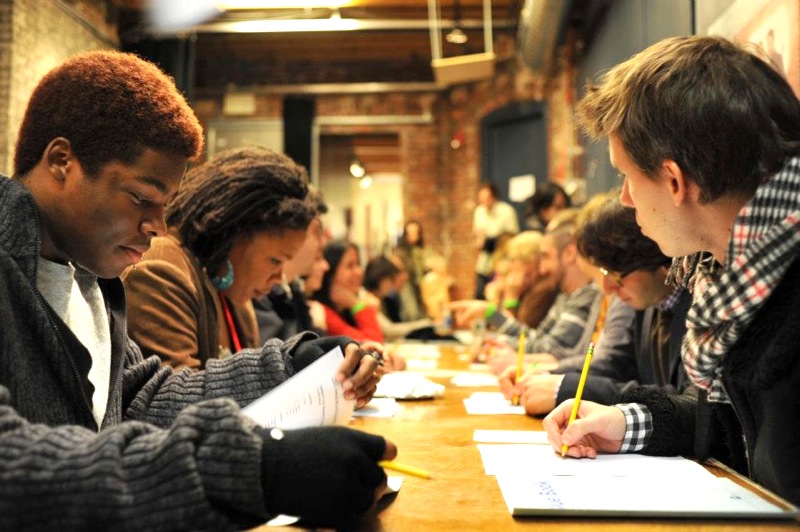 ExEc participants taking the Anhoek Required Examination at Cloud Place
ExEc participants taking the Anhoek Required Examination at Cloud Place
The Industry Lab is an "artful co-working space" tucked into a nondescript industrial building in mid-Cambridge that was created by MIT Media Lab alumni. It's a beehive of innovators who design and build robots, implantable medical devices, art installations and software, sharing space and bouncing off one another as they pursue their separate dreams. The innovation tourists interacted with the lab's denizens over pizza and beer and viewed rush cuts of videos taken at earlier stages of the event.
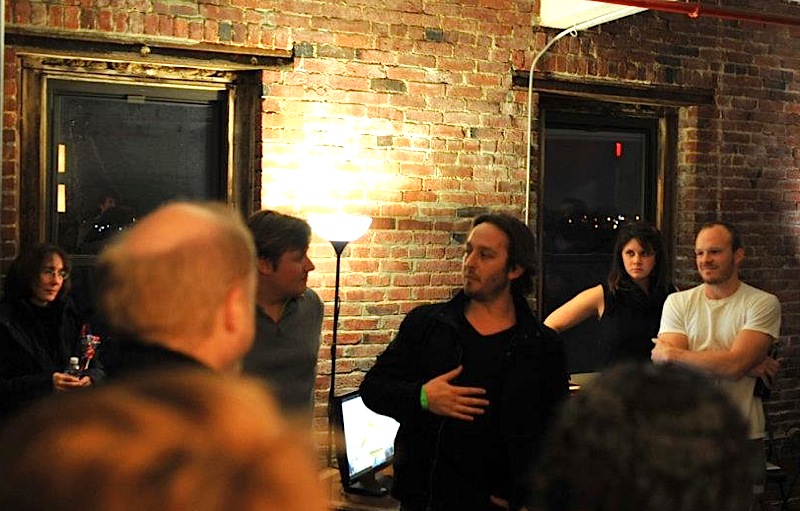 Elucidating innovation to participants at Industry Lab
Elucidating innovation to participants at Industry Lab
So, how well did this mash-up of history of science, technology, marketing, start-ups, and participatory performance art sit with the participants? Overall, pretty well. In thanking the hosts, one guest said "Experience Economies was absolutely terrific ... By far one the best events/shows/parties/experiences I've been to in Boston." Another one simply noted, "There is no way you could find anything cooler to do on a Saturday night."
If you would like to host an event along the lines of this one, drop a line to experience.economies-at-gmail.com.
By Geoff Dutton
Photographs by David Dimaria
Reader Comments